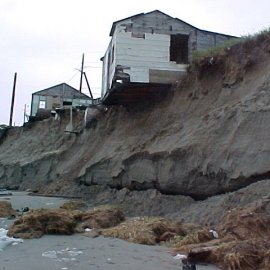A Tale of Two Ocean Cities
-
English
-
ListenPause
[intro music]
Welcome to World Ocean Radio…
I’m Peter Neill, Director of the World Ocean Observatory.
“It was the best of times, it was the worst of times, it was the age of wisdom, it was the age of foolishness, it was the epoch of belief, it was the epoch of incredulity, it was the season of Light, it was the season of Darkness, it was the spring of hope, it was the winter of despair, we had everything before us, we had nothing before us…”
These are the opening lines of Charles Dickens’ 1859 novel, A Tale of Two Cities, one of the most popular fictions of all time. Dickens was writing about the French revolution, a period of intense social turmoil and political upheaval; this first paragraph concludes: “we were all going direct to Heaven, we were all going direct the other way—in short, the period was so far like the present period, that some of its noisiest authorities insisted on its being received, for good or for evil, in the superlative degree of comparison only.” Noisy authorities. Superlative degree. Light. Darkness. So far like the present?
Reading those lines, I cannot but compare them to the circumstance we face today; the similarities are evocative certainly, coincident at worst. Thinking on this, it occurred to me to exemplify the irony through a tale of two ocean cities, far apart, one smaller, one larger, but faced with the reality of our time so socially and politically uncertain and affected by disruptive consequence from premeditated action against the nurturing continuum of water.
The first is Newtok, Alaska, a Yup’ik village on the Ninglick River on the Bering Sea, population 380. In a recent National Geographic article, the situation was described as follows: “Thawing permafrost and erosion has increased flooding risks and caused the land around homes to crumble and sink. The community landfill has washed away, fuel storage tanks lean precariously, and some houses have already been torn down because they were in danger of collapsing…So, after years of planning and construction, families began arriving in the freshly minted village of Mertarvik, about 10 miles southeast on Nelson Island. During breaks in the high winds and heavy rains that lashed the Yukon Delta, eighteen families made the move and began unpacking belongings in their newly built energy-efficient homes.” There is only housing for one third of the Newtok families, with electricity, but no public water and sewerage systems, no school. This small event, planned since 2003, is a front-line consequence of climate change. For those moving, for those forcibly staying behind, which is it? Best of times? Or worst of times?
Now, transport yourself over 6,000 miles across the Pacific Ocean to Jakarta, Indonesia, a mega-city of over 30 million people that is confronting similar cause and effect : global warming, subsidence as result of over-consumption from the water table, industrial and human pollution of fresh water systems, sea-level rise compounded by extreme weather, land erosion and indiscriminate filling of coastal lowlands to house economic expansion and population increase, corruption of existing governmental regulatory controls and proposed construction of new, very expensive mitigation structures. All these to an extreme that paralyzes response in place and time. Enormous geo-engineered solutions such as giant offshore barriers, dikes built on top of existing dikes, new dams, canals, giant water collection areas, and complex control technologies—all these have been proposed at astronomical cost of trillions on trillions, typically under-financed or realistically beyond financial possibility. And finally, there is the unimaginable social prospect of relocation of millions of people, facilities, housing, and services to some other, perhaps safer, more-protected place in what is essentially a low-lying island nation surrounded by water. Worst of times? Best of times?
The exponential magnitude between Newtok and Jakarta is almost beyond calculation, but the impact on the people who live there, desperately responding to changing climate conditions, disruption, community resilience is tragically the same. Dickens writes:
“It was the age of wisdom, it was the age of foolishness, it was the epoch of belief, it was the epoch of incredulity, it was the season of Light, it was the season of Darkness, it was the spring of hope, it was the winter of despair.”
Which is it? Which will it be? What will it take?
We will discuss these issues, and more, in future editions of World Ocean Radio.
[outro music]
This week on World Ocean Radio we tell a tale of two cities--Newtok, Alaska (pop. 380) and Jakarta, Indonesia (pop. 30 mil)--6,000 miles apart yet facing similar realities of turmoil and social uncertainty due to fresh water stress and the myriad disruptive consequences of climate change.
Do you prefer the written word? Head on over to Medium.com/@TheW2O.
About World Ocean Radio
World Ocean Radio is a weekly series of five-minute audio essays available for syndicated use at no cost by college and community radio stations worldwide. Peter Neill, Director of the World Ocean Observatory and host of World Ocean Radio, provides coverage of a broad spectrum of ocean issues from science and education to advocacy and exemplary projects.
Image Credit
Tony Weyiouanna, SeaGrant Alaska
- Login to post comments




Comments
Peter I think does a great job of describing these two worlds that have on big thing in common, and that is a real fear of land loss and damage to life in these two parallel cities. The cities both facing these tremendous realities really show the gap between these two ocean cities, and this is shown by the way these two areas deal with these situations. Newtok having to really live with these massive floodings and having to rebuild. While the city of Jakarta has the resources and power to build massive dikes and runway systems that can help prevent the damage that is certain to come.